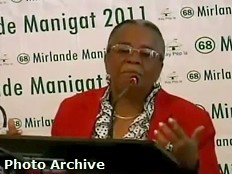THOMONDE, Haiti (Reuters) - Like the seasoned entertainer that he is, Haitian carnival music star and presidential contender Michel "Sweet Mickey" Martelly is working the crowd.
Gesticulating with one hand, cracking jokes in Creole, the 50-year-old, shaven-headed singer draws cheers and hoots of laughter from his audience, showing the powerful communication skills and popular touch he hopes will propel him into his country's top job in a run-off vote on Sunday.
Far from being unnerved by suggestions from the camp of his politically more experienced opponent, 70-year-old former first lady and law professor Mirlande Manigat, that he lacks the profile to be president, Martelly has turned the personality issue into a campaign weapon.
Responding to critics' jibes that his colorful past as an iconoclastic entertainer -- which has included antics like dropping his trousers on stage -- disqualifies him from being president, the wealthy star of Haiti's catchy Konpa carnival music is brashly unrepentant.
"They've been saying I dropped my trousers. Yes, I did. But I always pulled them back up again," he said, drawing guffaws from the mostly young audience packed into the square of the farming town of Thomonde in Haiti's Central Plateau region.
"There are people who've been dropping their trousers over the heads of Haitians for 20 years at the National Palace but they never pulled them back up," Martelly bellowed into the microphone, wearing a pink striped polo shirt and blue jeans.
In Sunday's decisive run-off that will elect a successor to President Rene Preval, policies seem to be taking a backseat to personal styles in the contest to choose a leader for the Western Hemisphere's least developed state.
Overwhelmed by poverty, corruption and mismanagement for decades, the hapless Caribbean country bears the still raw scars of a devastating 2010 earthquake that killed more than 300,000 people. Haiti also suffered floods and a deadly cholera epidemic after the quake.
The United Nations, with a more than 12,000-strong peacekeeping force in Haiti, and the United States and other major foreign donors hope Sunday's vote will deliver stable new leadership and avoid the chaos, widespread fraud and unrest that marred the Nov. 28 election first round.
Political neophyte Martelly is telling voters his energetic style is just what the country needs to blow away the cobwebs of a jaundiced political establishment viewed as selfish, corrupt and ineffectual by most Haitians.
"We represent a new way of doing and thinking," he told Reuters after addressing the Thomonde crowd. "We represent the wind that is blowing to establish a new state of law, a state where public function becomes service to the people, contrary to what is happening today," he added.
A recent opinion poll by local pollster Brides put Martelly ahead in the contest, with nearly 51 percent of the vote. The survey gave rival Manigat some 46 percent.
"PINK MILITIA"
Underlining the contrast in styles, opposition matriarch Manigat, who has years of experience in politics and academic life, sees a possible threat to Haiti's fragile democracy in Martelly's muscular style and the way he mobilizes supporters.
At a news conference in Port-au-Prince on Wednesday, law professor Manigat accused Martelly supporters of attacking with stones and bottles a rally she tried to hold in Mirebalais, south of Thomonde, in the Central Plateau on Tuesday. At least one person was hurt, she said.
Referring to the party color of pink worn by Martelly and his fanatical young backers, she denounced what she called the apparent formation of a "pink militia" that she said could pose a dangerous threat of political intolerance.
"I don't desire a dictatorship for my country, wherever it comes from," she said, appealing for calm among voters.
Madame Manigat is battling perceptions from some critics that her Sorbonne education and professorial style may be keeping her aloof from a largely destitute and poorly educated Haitian electorate.
The wife of former President Leslie Manigat, who was elected in 1988 but forced into exile by a coup soon afterward, Manigat gained the most votes in the November 2010 election first round but not enough to win outright. She would be Haiti's first elected female president if she wins.
In an echo of the ill-tempered first round, Martelly exhorted supporters to "vote -- and watch out," saying plans were afoot to "steal" what he forecast would be his victory.
Haiti's already feverish political climate is being stoked by reports that this week may see ousted ex-President Jean-Bertrand Aristide, a leftist, charismatic former Catholic priest, return from exile before Sunday's vote in a move the United States and other Western donors fear could distract voters from the Manigat-Martelly contest.
(Additional reporting by Joseph Guyler Delva, Editing by John Whitesides)
By Pascal Fletcher













